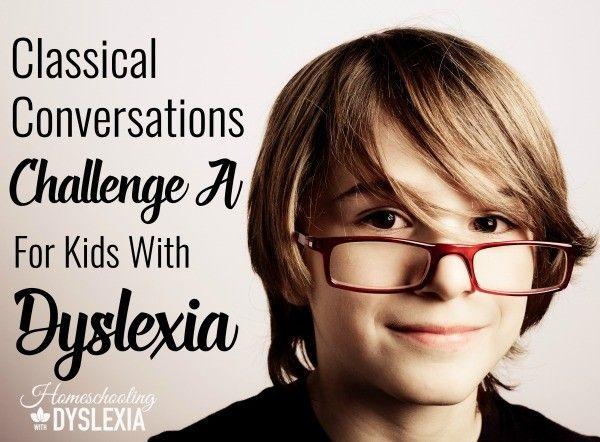
If you’re like me and thought that the Classical Conversations homeschool co-op was just too rigorous for your child with dyslexia, think again.
Our family has two years of the elementary program, Foundations and Essentials, under our belts and are still loving it. To learn more about the Classical Conversations Foundations and Essentials program and how it has worked with our kids with dyslexia, read this post.
Challenge A and Dyslexia
This year, we will be branching out into the middle school Challenge program, specifically Challenge A, for 7th grade. Because we started Classical Conversations (CC) late, we opted to have our dyslexic daughter stay back from Challenge A last year in 7th grade, complete another year (her 2nd) of Foundations and Essentials, and begin Challenge A in her 8th grade year. (Lots of kids do this by the way.)
We chose to do this because we wanted to give her the advantage of another year of writing, grammar and memory work. Before even beginning Challenge, we are seeing the fruit of this choice as she has been previewing her Latin homework and already has memorized the noun declensions. This previous knowledge will make learning the next layer of Latin information that much easier.
This is one example of why I like the CC program so much. The information is layered with the end goal in mind. Everything builds on itself as you continue through the later years of the program.
Accommodations and Modifications for the Dyslexic Challenge A Student
Our CC path is strewn with other families homeschooling their own dyslexic kids. In fact, there will be three students with dyslexia in our daughter’s Challenge A class this year! Last week I spoke with a few moms with dyslexic kids who have been through the Challenge A (and B, I, II and now III) program with success. They shared with me how they handled the accommodations and modifications for their kids. I searched the Internet high and low several years ago for this kind of information to no avail. That is why I’m so happy to share this with you today.
LATIN
Latin is probably one of the most intimidating subjects in the CC curriculum. It is important to note that Challenge A students will move slowly through the Latin texts (Henle First Year & Grammar), only completing about a third of the text this year. In Challenge B, they will start at the beginning moving more quickly through the material and cover about two-thirds of the books. In Challenge I, the kids will start again at the beginning and work their way through the entire text. Key take away: mastery is not the objective in Challenge A. Exposure, practice and acquiring the discipline to study Latin daily can easily be your child’s main goals.
Latin accommodations and modifications
- Both moms allowed some of the weekly work to be completed orally, depending on what else was going on that week.
- While the program recommends that students create their own flashcards, one mom whose son had no Foundations and Essentials experience (and has a profound dyslexia) printed the flashcards from the Quizlet app.
- Quizlet is an AWESOME study tool for students with dyslexia.
- Some days the kids are assigned 20+ sentences to translate. One way both moms scaled this back for their kids with dyslexia was to assign only odd or even problems or to have the child complete the translations orally.
- Neither parent had their kids translate from English into Latin. Latin is primarily used for translating ancient text into English and so is a skill that is not nearly as valuable as translating from Latin to English.
- Both moms also stressed the importance of drilling their flashcards daily.

COMPOSITION
The focus of Challenge A is to learn how to write a compelling persuasive essay using the Lost Tools of Writing (LTW) curriculum. Topics are chosen based on assigned literature.
Composition accommodations and modifications
- Both moms I spoke with highly encouraged the use of audio books. Audible has most of the books and Learning Ally has some that even Audible doesn’t have. You can purchase a Learning Ally is subscription right now through the Homeschool Buyers Co-op for only $77.95. This is a 42% savings. If you need a referral for Learning Ally audio books, see this post. For more information on how to synch Audible books with Amazon eBooks to enjoy Immersion Reading, read this post.
- LTW starts slow. Be sure to watch the online videos provided by LTW and remember that there are samples of each essay the kids will write in the back of the LTW Teacher Guide.

GEOGRAPHY
By the end of Challenge A, students will practice drawing the world by memory including states, territories, capitals, major waterways and mountain ranges. Not all kids are able to learn everything in Geography, dyslexic or not. It is important to note that every student will come away with a certain amount of knowledge – very likely more knowledge than the majority of the population – so don’t sweat it!
Geography accommodations and modifications
- While tracing maps is discouraged by CC in general, both moms I interviewed allowed tracing at least for the first day to build muscle memory.
- Consistency is a must. Practice drawing every day.
- Use the free online Geography games at Sheppard Software to learn countries and capitals. Have your kids play the games 2 or 3 times each day.
- Be sure to print up flashcards to learn the geography terms and review them daily.

SCIENCE
Science consists of students completing their own research on a topic relating to Natural Science and then Biology and presenting their research to the class with illustrations. Most dyslexic kids didn’t struggle with science in Challenge A. Know that your child will progress dramatically throughout the year. One student wrote only several sentences for their first science research presentation.
For more tips on how to teach writing to students with dyslexia, read this and this.
Science accommodations and modifications
- Decrease the number of facts for the key word outline.
- Decrease or do not assign the written report.
- Allow your child to read their report for their presentation.
- Reduce the number of terms to be researched.
- Reduce items to be labeled on the anatomy drawings.
- Label the blackline drawing of the anatomy system instead of drawing and labeling the system.

RHETORIC/ APOLOGETICS
Two general topics are discussed during Challenge A: thinking and speaking truthfully and a comparison of evolution vs. intelligent design. Students are assigned weekly reading, outlining, and summarizing of key ideas and arguments and will be asked to memorize a series of catechism-style questions and answers about science and Creation.
Rhetoric accommodations and modifications
Both moms I spoke with suggested reading It Couldn’t Just Happen (first semester) and The Fallacy Detective (second semester) out loud with your kids. I was super excited to hear this because I had planned on reading them aloud with all of our kids during our morning time.
- Be sure to print up the catechism questions and answers on flash cards and review daily.

MATH
- Math during class, also referred to as seminar, is a discussion of math topics and mental math exercises.
- Classical Conversations recommends Saxon 8/7 and uses sample problems from that curriculum each week for discussion. It is okay to use a different math curriculum.
- Practice math facts at home.
- I’m sending my daughter with her multiplication chart and factor chart (a total Godsend). Not sure if she’ll need them or even be able to use them but they are an accommodation we make at home.
- One parent I talked to had their son do no math during the school year to give him more time to focus on CC. He did his math all summer.
- A more moderate accommodation would be to only do math three days a week instead of four.
GENERAL TIPS
- There are a variety of suggestions for ways to scale assignments in the Challenge A Guide. Scaling is expected, at least some of the time.
- Start with the goal of doing every assignment from each subject for a set time – maybe the first 8 weeks until the first break. This shows the student that they are indeed capable of doing the work. Then begin to scale back the required work to meet your child’s needs.
- Front load your homework. By setting aside the first two days after seminar to get a lot of the weekly assignments finished, your student will be left with a sense of accomplishment and have an extra margin of time should something unexpected come up.
- Be sure to talk with your child’s Challenge A tutor or director when you tailor assignments.
Whew! That was a big post.
How about you? How have you tailored or scaled back during the Challenge years with your dyslexic student?
Related Posts:







We are a CC family and we also had our dyslexic daughter start Challenge A in “8th” grade. This allowed her to go thru all 3 cycles and complete 2 years of Essentials. (we did not enroll in Essentials our first year). She has also completed B is now starting Challenge 1.
I completely agree with listening to the audio books and reading aloud It Couldn’t Just Happen and Fallacy Detective. We loved all the books and her two younger brothers would listen in too.
She is a natural artist so the geography and anatomy drawings were some of her favorite parts of A. I did not require her to spell the capitals or countries correctly! We also printed off flashcards for the countries/capitals and would drill those together.
I found that she has learned to work hard and be very diligent in her studies, which I think is a almost a “byproduct” of being dyslexic.
With Latin we really tried to work on memorizing the vocabulary and the grammar rules. We did not complete every exercise every week. Most weeks we only did the odd numbers of the exercises. But having much of the vocabulary memorized helped tremendously when she started B the next year.
I totally agree to work diligently for the first 6-8 weeks because they really will surprise themselves with how much they can accomplish and learn.
I did type her papers for her and help edit them. She is now typing on her own, but I still help edit. I remember really trying to “spoon feed” and help as much as possible in the beginning because I did not want her to shut down. Eventually she got in a rhythm and was able to manage her time well.
We definitely had some hard days, but by the end of the year I sat at our End of Year Celebration and just had tears rolling down my face as I realized how much she had learned and accomplished that year. It was a huge growth in her confidence (and mine!)
This is very encouraging. Thank you for sharing! I appreciate your thoughts:
” I totally agree to work diligently for the first 6-8 weeks because they really will surprise themselves with how much they can accomplish and learn. I remember really trying to “spoon feed” and help as much as possible in the beginning because I did not want her to shut down. Eventually she got in a rhythm and was able to manage her time well.”
I was thinking of starting out slowly, be cause my son will shut down, but I know he can do the work. He does not need me to drastically cut the work, just help him get up on the horse!
Also, I’d love any advice from moms that have had dyslexic kids complete the higher level Challenge classes. Thanks and I love your blog!
Would love to know the factor chart you reference in this post!
This is the one that we liked best: http://magnusbirkner.blogspot.com/2011/12/factor-table.html
I have four Children with Dyslexia and have been a part of CC for 8 years! I now have three in Challenge and love the flexibility of the program! This is an excellent article with great suggestions that we have used!!!! I highly recommend you incorporate the Barton Reading and Spelling g program! Even if just during the summer!!! It is amazing and life changing!!! Don’t cut corners… I did and it didn’t work! It is amazing to watch my kids blossom in Chalkenge!!!
Hi Marianne,
I would be very interested in hearing how your daughter is progressing in Challenge A through the year. If you are able, would you please do a post mid-way through and let us know how you may have readjusted?
My daughter is in 7th grade, the youngest of our 4 and she is dyslexic. I believe I suffer from this challenge more than she does! I fall into that category of possibly making things too easy. How hard should I push? Is she being lazy or is this dyslexia? How much help does she really need? I keep thinking Challenge A might be good for her next year for 8th grade, however, I keep falling back on the phrase, “it’s going to be too difficult for her.”
Suggestions? Encouragement???
Hi Tina. I know how you feel! I am keeping weekly notes and will definitely post each quarter on how she is doing. So far she is doing really well. It is a lot of work but she is capable. We are scaling back in some areas (mainly Latin) and finding a good balance of work to play. I don’t want her to burn out. So far, we LOVE Challenge A. PS. It’s been 4 weeks since we started. 🙂
How is your schedule accommodating the Foundations and Challenge A working?
I am homeschooling a 9 yo (with dyslexia and medical issues affecting working memory) and a 13yo with dyslexia (lots of APD, slow processing and severe dysgraphia). This is our first year with CC and it has been a great help to both of them.
My 9yo has been on AAR/ AAS level 1 and Math-U-See level 1 for the past year. I was hoping just the exposure would help, but it was too overwhelming for her. However, she is working at double the speed from 6 months ago! Her impulse control is such that I cannot leave her alone for more then a few minutes.
My nephew has thrived in the environment and has back some of the “spark” for learning he lost when the public school started to limit his academic choices. He is fairly well prepared for class, but that is with a lot of accommodations/ support at home (Loves the Latin and LTW?!?!?!)- making it a little hard for me to keep up with both schedules/ needs.
I find some weeks it’s manageable, but (especially with Field trips)… I end up neglecting one of them. I’ve been mostly neglecting the 9yo- Hope I can “catch up” with her reading/ math after Thanksgiving “break”. Given her memory issues, I felt it was important to give her some confidence that she can keep up with the other kids (she’s the oldest in her class). At the same time (of course), I’m feeling guilty about the “neglect”.
Do you have any other suggestions?
Sorry if I didn’t make it clear… the 9yo is in Foundations…we held off on Essentials.
I’ll give you some suggestions, however, you are the only one who has the direct experience with your unique family dynamic – so these are just ideas. I would put the primary focus on your nephew as he is older. It takes some time to get going with Classical Conversations Challenge. Remember to check the guide to see ways to scale his work. He should be doing no more than an hour per day per subject. Therefore, if Latin is taking 2 hours a day, you’ll need to scale back to what he can comfortably do in an hour a day. There are lots of recommendations for scaling in the guide. I would also look for ways for him to become more independent by using assistive technology such as speak to text and audio books.
For your 9 year old, I would focus solely on reading and math. Foundations is enough for her right now. I would supplement with audio books so that her vocabulary and knowledge of grammar grows. If you can do reading at least 3 times per week, that is what I would consider a minimum. We all have crazy weeks at times. If you are unable to get to reading on a regular basis, I would consider an Orton-Gillingham trained tutor. You may need to cut back on outings for a time. I know that for our family, with the extra time demands due to dyslexia, we are limited on how much we can be out and still get enough work done. Of course, we are always free to take mental health breaks as needed. 😉 Hope this helps!
I really appreciate your blog. I had tears rolling down my face as I read this post. My 8 yo is my child with dyslexia and I can’t even imagine him being able to do Challenge. We just finished A with my oldest, for whom everything comes easily, and it was definitely a challenge. He’s growing so much and I know things will be different in 4 years, but WOW! Thank you for this post and others like it.
Hi Jessica. Every child is different. I feel much the same as you about my 9-year old. It doesn’t seem possible that he would ever be able to acquire all of the skills needed to succeed with Challenge. One day and one year at a time, right? My thoughts are to keep their love of learning intact, teach them about perseverance, and maintain a strong, open relationship with them. Well, and teach them to read, write and spell!
we are a cc family and i do believe in the program. However my daughter started essentials this year and i tutored it to make things smoother for her. She does the work at home with me with hand motions and songs and i work as her scribe. but in seminar she sits in the corner sad. She cries at times during math because it’s too hard for her to keep up. She completely spaces out during writing time (though this is her favorite subject at home) When we talk at home she says class time is information overload. That her brain hurts and she wants to snuggle when we get home… she’s so overwhelmed. She’s supposed to complete one more round of Essentials. But is asking me not to send her. She says the one class wears her out and I’ve witnessed it do so. She’s smart and able to think and discuss Essentials work but cannot read or write most of it. And the pace of class time is intimidating. What would you recommend? do i have her only do foundations next term and focus on remediation at home? Or push through and get her into Challenge in two years… or is this just not a fit for my girl?
I’m just finding this article now (January 2019) so not sure if you will see this, but I have a dyslexic daughter who is currently in B—she (and I) are hesitant about the high school challenge levels and curious to see what your experience has been and any tips! Thank you
I know lots of kids with dyslexia who do well with the higher levels of Challenge. For my daughter, now is Challenge 1, it is less and less of a good fit. It could be her ADHD that makes it hard to focus, or a general lack of interest in the content. We are looking for other options for next year.
Challenge A seemed to be a good fit for our dyslexic son until we got about 8 weeks in. The “scaling” ended up not being enough and didn’t allow for my son’s learning differences. Director kept making comments about how much he couldn’t do compared to the other kids. Then because the scaling wasn’t enough according to CC’s requirement for in class we ended up pulling him after paying in $1200 (for 8 weeks). Challenge is not for kids with special needs and doesn’t account for learning differences. If the director and overseeing personnel don’t understand children with special needs or have time for it don’t bother. Do what works for your child at home. I have a degree in Special Education and didn’t care for the over arching attitude in the program. It’s rigid and arrogant. Not for everyone. Ask questions before enrolling your child to see what the program is offering your child and how much you as the parent will be doing… There wasn’t much I found that we were paying so much for… You can have a much more successful program without paying for a syllabus of assignments.
I think so much of what you’re describing depends on the directors. Our director has kids with profound dyslexia and is very supportive of our kids. However, Challenge 1 has been more of a challenge and I see a change for our older daughter for next year.
We have done Foundations for 5 yrs. W 2 yrs of Essentials. I can see my oldest (10yo) thrive in Challenge. She was my “easy” HS student. Learned to read pretty much half way through reading program.
However, I have two younger siblings (8&7yo) that have had difficulting in learning to read and they are just showing some different learning abilities than my first born. I suspect dyslexia. My 8 yo asks to listen to audiobooks and I can see it just takes a bit for her to “get” some things in her schooling. I am grateful to have come across this article even through I know every child is different.
We are at crossroads trying to decide if we continue with CC or do it on our own at home or switch to a different curriculam…I will be checking our My Father’s World.
Do you have any insight from your experience? Thank you!
It really is a personal decision. After 5 years in CC, our youngest two (8 and 11) will be taking a break from CC next year. We joined a homeschool group that offers classes and field trips. It was just what I felt they needed this year. Our older dyslexic daughter will finish Challenge 1 this year and also take a break from CC. Not that we don’t love the program but she needs more accountability. This is a common theme in the teen years!